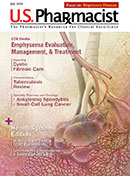Researchers conducted the phase lll Lung-MAP S1400I open-label, randomized clinical trial to ascertain whether adding ipilimumab to nivolumab can improve clinical outcomes in patients with advanced, previously treated, immunotherapy-naive squamous non–small cell lung cancer (SqNSCLC). The primary endpoint was overall survival. Secondary endpoints included investigator-assessed progression-free survival and response per Response Evaluation Criteria in Solid guidelines, version 1.1.
The researchers randomized patients in a 1:1 ratio to receive nivolumab alone or combined with ipilimumab. The trial included 252 eligible patients with an average age of 67.5 years (range, 41.8-90.3 years). A majority of patients were men (67%), and most were Caucasian (82%). Researchers found that overall survival was not considerably different between the groups (hazard ratio [HR], 0.87; 95% CI, 0.66-1.16; P = .34), and average survival was 10 months (95% CI, 8.0-14.4 months) in the nivolumab/ipilimumab group and 11 months (95% CI, 8.6-13.7 months) in the nivolumab group.
The response rates were reported as 18% (95% CI, 12%-25%) and 17% (95% CI, 10%-23%) for the nivolumab/ipilimumab combination and nivolumab, respectively. Additionally, the average response duration was 28.4 months (95% CI, 4.9 months-not reached) for nivolumab/ipilimumab and 9.7 months for nivolumab (95% CI, 4.2-23.1 months). The researchers also reported the occurrence of grade 3 or higher treatment-related adverse events (AEs), with fatigue and pneumonia being the most common AEs in 49 of 124 patients (39.5%) receiving nivolumab/ipilimumab and in 41 of 123 (33.3%) receiving nivolumab alone.
Reports of toxic effects were noted in 31 of 124 patients (25%) taking nivolumab/ipilimumab and in 19 of 123 (15%) taking nivolumab. There were three treatment-related deaths in the combination arm and one death in the monotherapy arm.
The researchers concluded that, in their phase lll clinical trial, ipilimumab added to nivolumab did not enhance outcomes in patients with advanced, pretreated, immune-checkpoint inhibitor–naive SqNSCLC.
The content contained in this article is for informational purposes only. The content is not intended to be a substitute for professional advice. Reliance on any information provided in this article is solely at your own risk.
« Click here to return to Lung Cancer Update.
Published August 12, 2021






